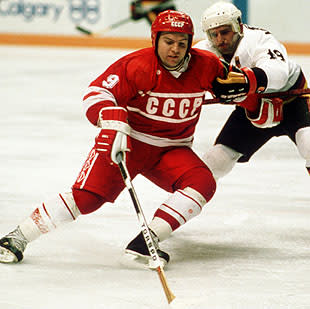Remembering Vladimir Krutov, Soviet hockey legend on KLM Line, who died at 52
Vladimir Krutov, Igor Larionov and Sergey Makarov are a trio known for comprising one of the greatest lines in the history of hockey for the Soviet Union during the 1980s.
On Tuesday, the world learned that Larionov and Makarov will now be referred to as the surviving members of the KLM Line.
Krutov, 52, died in Moscow, after being hospitalized with a gastric hemorrhage and abdominal bleeding on June 4. He won two Olympic gold medals and five world championships, playing one season in the NHL for the Vancouver Canucks in 1989-90.
"We've lost a man who no hockey player would hesitate to go into battle alongside," Vladislav Tretiak, president of the Russian Hockey Federation and Soviet goaltender at four Olympic Games from 1972 to 1984, said on the federation's website.
Tretiak compared Krutov to Valeri Kharlamov, a star of the 1972 Summit Series between the Soviet Union and Canada, and another member of the 1980 Olympic team. "He was very similar indeed to Valeri Kharlamov; a man of few words, who always did everything he had to do on the ice, and you could rely on him 100 percent," Tretiak said.
In a 2008 blog urging the Hockey Hall of Fame to enshrine the entire KLM line, hockey historian Joe Pelletier wrote:
Krutov was a cannonball of a forward, nicknamed Tank because of his stout nature and robust play. With a double chin at the age of the 19, he didn't look like a typical Soviet athlete. His crafty play was matched by a hard competitive edge, resembling the great Boris Mikhailov. With his speed and strength he was one Soviet forward who was very effective along the walls and in the corners. I can't decide which was more impressive - Krutov's astonishing rocket bursts from a stand still or his piercing wrist shot.
For NHL fans, Krutov's time in the League was all too brief.
On Sept. 7, 1989, Canucks President Pat Quinn announced that the 29-year-old Krutov had signed a 3-year deal to join Vancouver and play with his old mate Igor Larianov.
It turned out to be the wrong move for both the team and the player: The Canucks made the two Russians their highest paid players, causing some locker room strife according to Coach Bob McCammon; and as Petr Polak of Euro Hockey noted, it Krutov couldn't fit in with the NHL:
Maybe Krutov would have also been able to adapt to the North American game, but he wasn't able to manage his lifestyle. He was accustomed to very strict discipline in the Red Army, and suddenly he was in Canada, where he had a lot more freedom to manage his personal time.
He received a contract for $2.1 million per year and was faced with an endless world of opportunities and didn't know what to do with his free time. Vladimir started to enjoy the life and money and was not able to discipline himself. 1989-90 Canucks head coach Bob McCammon said, "His usual routine was to stop at a 7-eleven Store and order two hot dogs, a bag of potato chips and a soft drink. After practice, he would return for a second order."
But 34 points in 61 NHL games isn't his legacy. Those 137 points in 112 international games are his legacy. His 12 Soviet League titles, 5 IIHF world championship golds and two Olympic goals are his legacy.
And, of course, his role in authoring this kind of hockey poetry with his linemates is his legacy:
Hockey lost a legend in Vladimir Krutov.

 Yahoo Sports
Yahoo Sports 


